

Most businesses have adapted to hybrid work environments, but making knowledge accessible to every team member remains challenging. To address the rising demand for seamless knowledge sharing, many tools have sprung into existence. Among these, Slite has emerged as a one-stop solution for collaborative documentation.
However, many businesses have been looking for Slite alternatives, as the tool has its share of drawbacks. For instance, some users desire more advanced features, while others want a less clunky interface.
If you’ve landed on this blog, you’re likely conflicted about picking a suitable Slite replacement. Go through our list of the 10 best Slite alternatives to discover the most well-rounded knowledge management solution for evolving business needs!
What is Slite?
Slite is an AI-powered collaborative knowledge management platform designed for organizations. It is a central hub for users to create, organize, and share internal documents, notes, and other work materials in an easily accessible digital workspace.
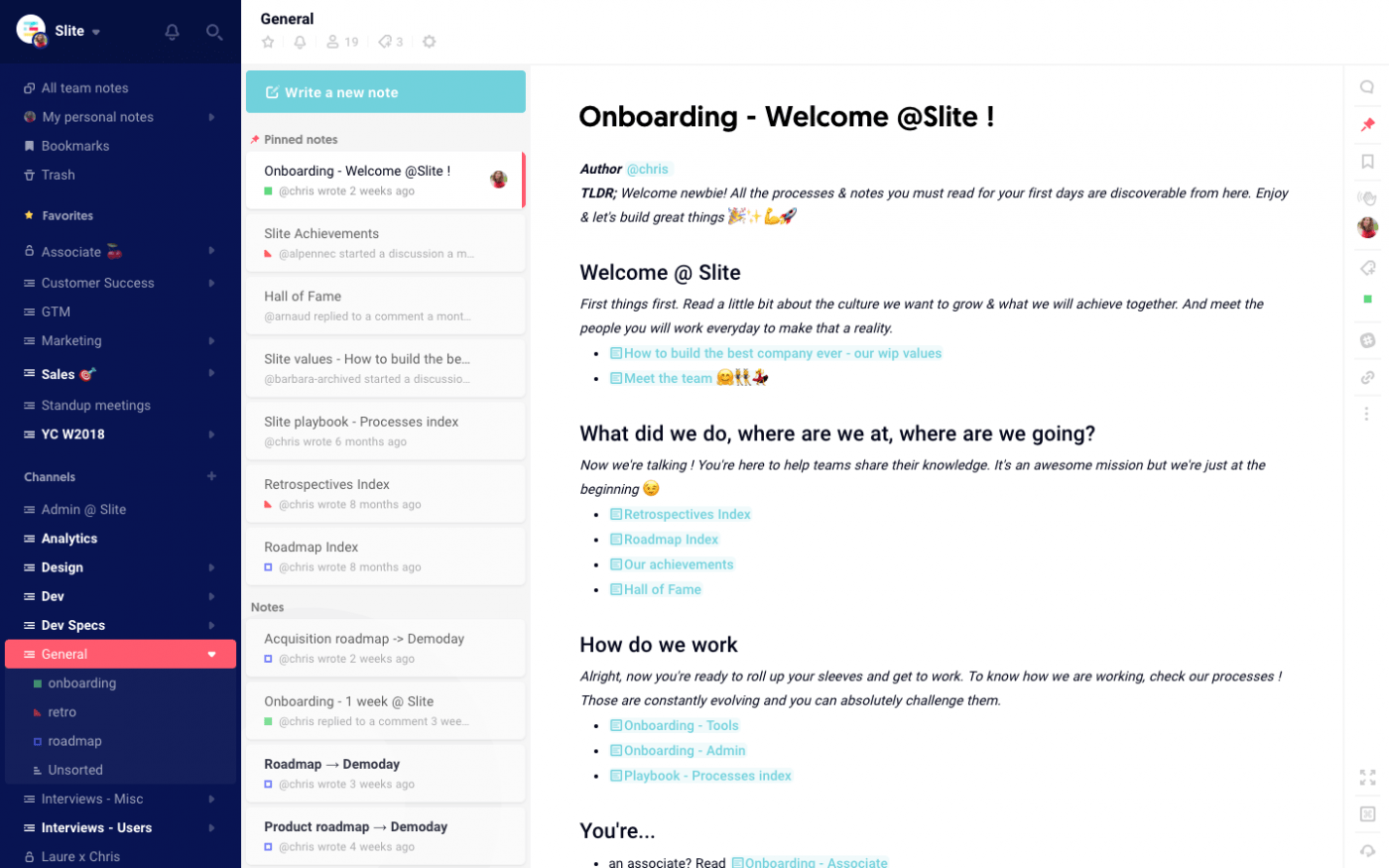
Besides helping you build a knowledge base, Slite helps track changes and share feedback on existing documents. Some of its key features include:
- Real-time collaboration
- Rich text editing
- Cohesive folders and categories to organize knowledge
- Integrations with business tools like Slack and Asana
- Robust search function
Despite these benefits, Slite’s relatively limited formatting and customization options can somewhat impair user experience.
What Should You Look for in Slite Alternatives?
The Slite alternative that would work for you depends on your individual needs. For example, smaller teams with tight budgets typically seek a more cost-efficient knowledge management solution.
But in general, here are some factors you should consider while exploring different products:
- Collaborative features: Ensure that the knowledge management tool enables teams to work together on documents and share knowledge while eliminating redundant efforts and departmental silos
- Usability and interface: Look for a user-friendly interface that your team finds easy to navigate and embrace 🧑💼
- Document organization: Pay attention to the presentation of knowledge assets, version history options, and built-in search functionalities
- Integration: Check if the software allows integration with other essential tools your team uses, such as project management, communication, and cloud storage platforms
- Customization: Go for Slite alternatives that help you tailor the platform to your team’s specific needs, hierarchy levels, and workflows
- Scalability: The tool must grow with your organization, accommodating an expanding team and increasing documentation demands with expandable storage space
The Cream of the Crop: 10 Top-Notch Slite Alternatives
Explore the 10 leading alternatives to Slite and find the perfect knowledge base platform that fits your needs in terms of ease of use, features, and pricing.
1. ClickUp

ClickUp is a top-ranked project management and knowledge base software with robust features to unify teams of all sizes. 🥇
With ClickUp Docs, you can create a comprehensive hub for your knowledge base, including procedural documents and training materials. Add nested pages, bookmarks, tables, or link Docs to tasks, projects, and workflows to set up a customized info-sharing ecosystem.
Your in-house and remote teams can have pertinent resources in one location, all well-categorized and made accessible through ClickUp’s Universal Search capabilities.
One of ClickUp’s key strengths lies in its all-encompassing approach to team collaboration with features like:
- Chat view: Helps collaborate on documents and share resource links faster
- Doc templates: Offers readymade pages with formatting and headers to frame routine documents like action plans and standard operating procedures
- ClickUp Whiteboards: Provides a digital canvas for brainstorming and can be added to your internal knowledge base
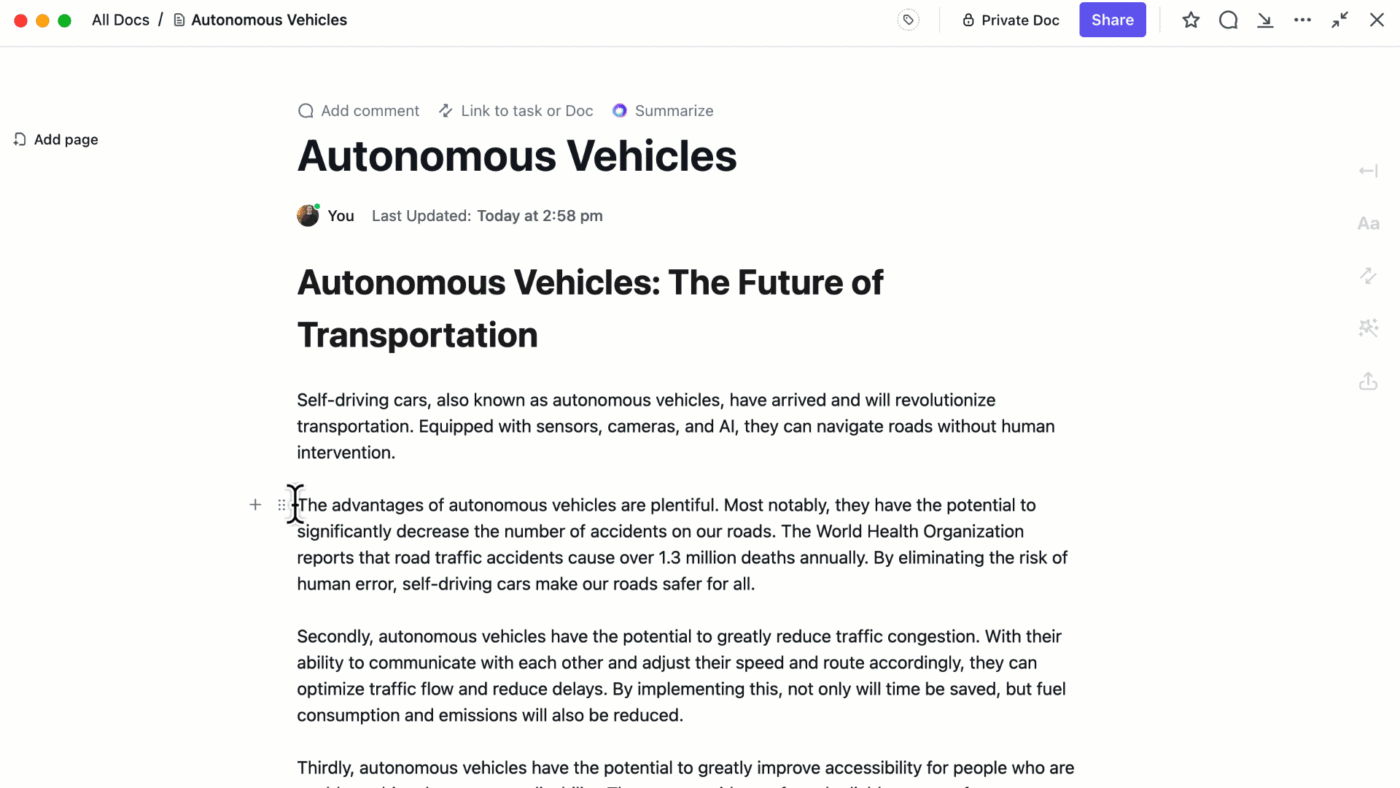
Leverage ClickUp AI, an expertly trained writing assistant, to save time on everyday knowledge management tasks. The feature offers role-tailored prompts for generating high-value documentation like project briefs, test plans, and delivery timelines within seconds! You can also use the AI tool to:
- Get real-time feedback on the grammar and flow of existing documents
- Summarize lengthy content for quick insights
- Brainstorm content ideas like survey questions and marketing taglines
ClickUp best features
- Centralizes your knowledge base
- Commenting and proofing tools for quick approval
- Advanced search and labeling options
- Real-time editing and brainstorming
- Pre-designed knowledge base templates
- AI-powered writing support
- Easy export and import of data
- Public sharing available (for client communication)
- Unlimited storage on all paid plans
- 1,000+ integration options (including Zoom, Gmail, and Hubspot)
ClickUp limitations
- Some features have a longer learning curve
- AI support is not available on the mobile app (yet)
ClickUp pricing
- Free Forever
- Unlimited: $7/month per user
- Business: $12/month per user
- Enterprise: Contact the company for pricing
- ClickUp AI is available on all paid plans for $5 per Workspace member per month
*All listed prices refer to the yearly billing model
ClickUp ratings and reviews
- G2: 4.7/5 (8,000+ reviews)
- Capterra: 4.7/5 (3,000+ reviews)
2. Notion
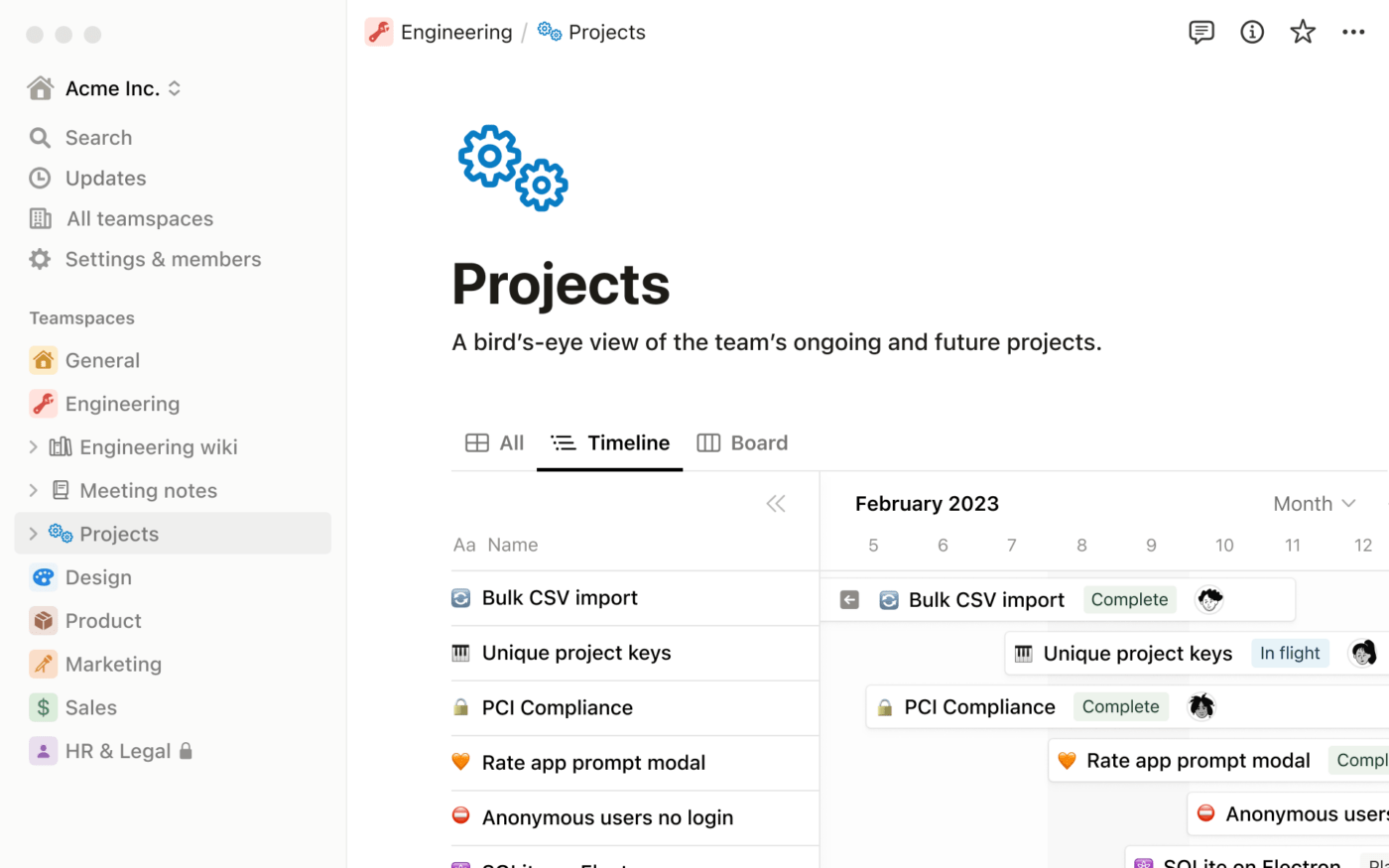
Notion is a sleek productivity tool that effortlessly merges many functions into one accessible workspace. Like ClickUp, it combines elements of a wiki and project management tool.
The simplicity of drag-and-drop and page nesting within Notion creates an environment where organizing information comes easy. Plus, you can embed 50+ different apps right into your Notion pages.
Whether collaborating with your team, embedding various media types, or creating formatted content within your repository, Notion’s quick referencing options reduce the friction that often plagues knowledge management workflows.
Notion lets you assign tasks, set due dates, and work together in real time, allowing your team to collaborate confidently. The workspace is entirely customizable, helping you craft layouts, templates, and databases tailored to your workflow.
Notion best features
- Task assignment and collaboration features
- Customizable layouts and templates
- Team collaboration through comments and change tracking
- Drag-and-drop functionality to organize information
- Rich embedding options
Notion limitations
- Could use widgets on the phone for pinning pages and databases
- Can get messy without consistent “housekeeping”
Notion pricing
- Free Forever
- Plus: $8/month per user
- Business: $15/month per user
- Enterprise: Contact the company
*All listed prices refer to the yearly billing model
Notion ratings and reviews
- G2: 4.7/5 (4,000+ reviews)
- Capterra: 4.7/5 (1,000+ reviews)
3. Confluence
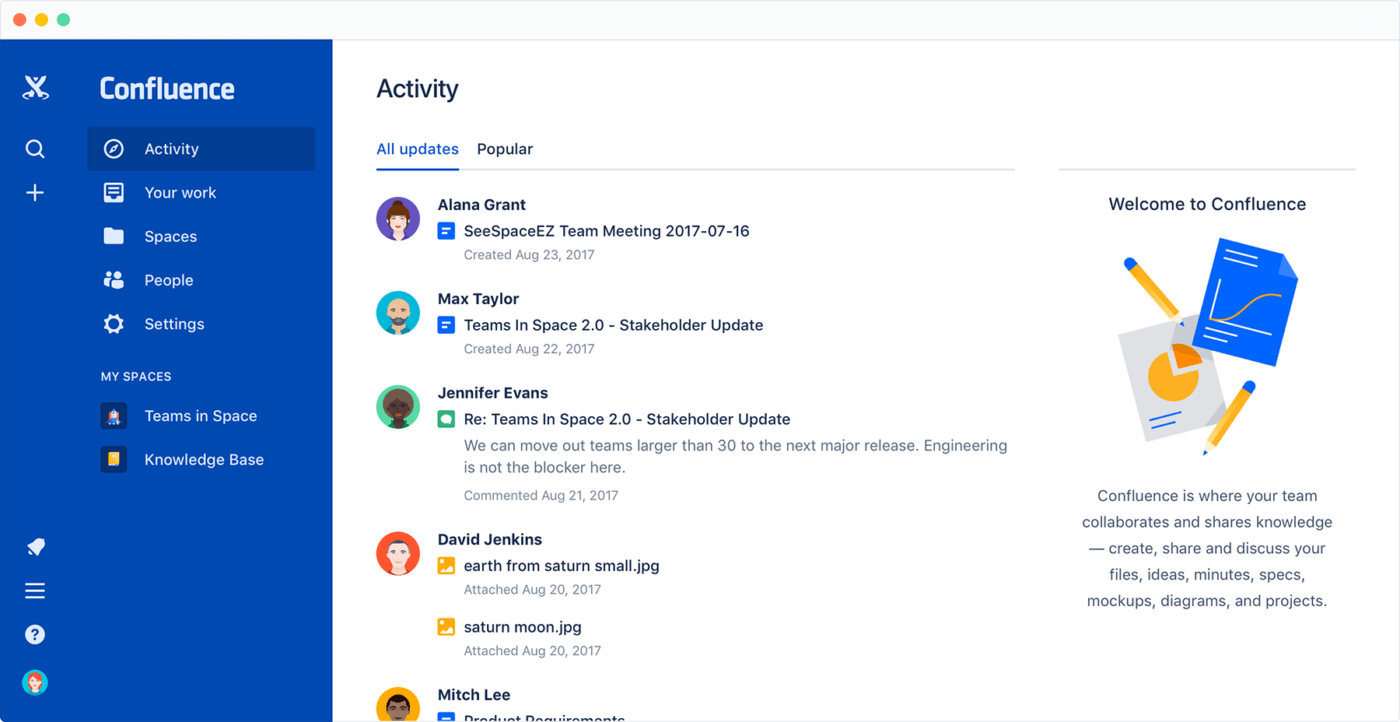
Confluence by Atlassian helps supercharge your work with internal wikis. The project management tool offers an extensive library of templates to set up new documentation for your team. Its seamless integrations with other Atlassian products (like Jira and Trello) simplify workflow management. 🌬️
Confluence organizes your workspace into pages, structuring your knowledge creation, categorization, and document access tasks. Use its advanced search system to retrieve documents in a jiff. You can also tweak roles and permissions to fine-tune resource access protocols.
The platform serves real-time notifications to keep teams in the loop, but its note-taking feature may lack versatility. You can explore Confluence alternatives if you’re looking for similar tools with better functionality.
Confluence best features
- Advanced search system
- Real-time notifications
- Flexible spaces to manage diverse knowledge domains
- Robust customizations for layouts, templates, and themes
- Handy export options
Confluence limitations
- Building pages may require more technical skills
- Managing permissions can get complicated
Confluence pricing
- Free (for up to 10 users)
- Standard: $6.05/month per user
- Premium: $11.55/month per user
- Enterprise: $107,500/year (minimum of 801 users)
Confluence ratings and reviews
- G2: 4.1/5 (3,000+ reviews)
- Capterra: 4.5/5 (3,000+ reviews)
4. Nuclino
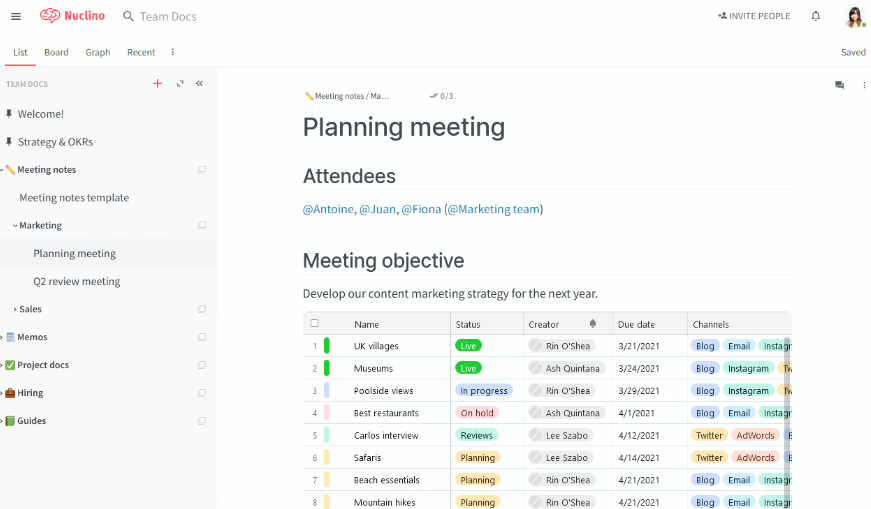
Nuclino is another Slite alternative offering a blend of internal knowledge base and wiki capabilities. Its hallmark is its clean interface and intuitive navigation, along with a real-time editing feature that allows multiple users to collaborate seamlessly on the same document.
Thanks to mentions and comments, every item within Nuclino can be a canvas for collaboration, in real time or asynchronously. The platform automatically preserves every change in the document history, ensuring you can revert to earlier versions when needed.
Where Nuclino excels in comparison to Slite is its comprehensive task management tools, which include a Kanban board, tables, and graphs. This broader spectrum of capabilities positions it as a versatile solution for various use cases, from sprint planning to issue tracking.
Nuclino best features
- Task management tools, including Kanban boards
- Automatic version history for tracking document changes
- Internal linking for connecting related items
- User-friendly design
- Efficient search and content organization
Nuclino limitations
- Limited integration options
- Could use more formatting options to promote brand-based styling
Nuclino pricing
- Free Forever
- Standard: $5/month per user
- Premium: $10/month per user
*All listed prices refer to the yearly billing model
Nuclino ratings and reviews
- G2: 4.7/5 (20+ reviews)
- Capterra: 4.8/5 (60+ reviews)
5. Document360
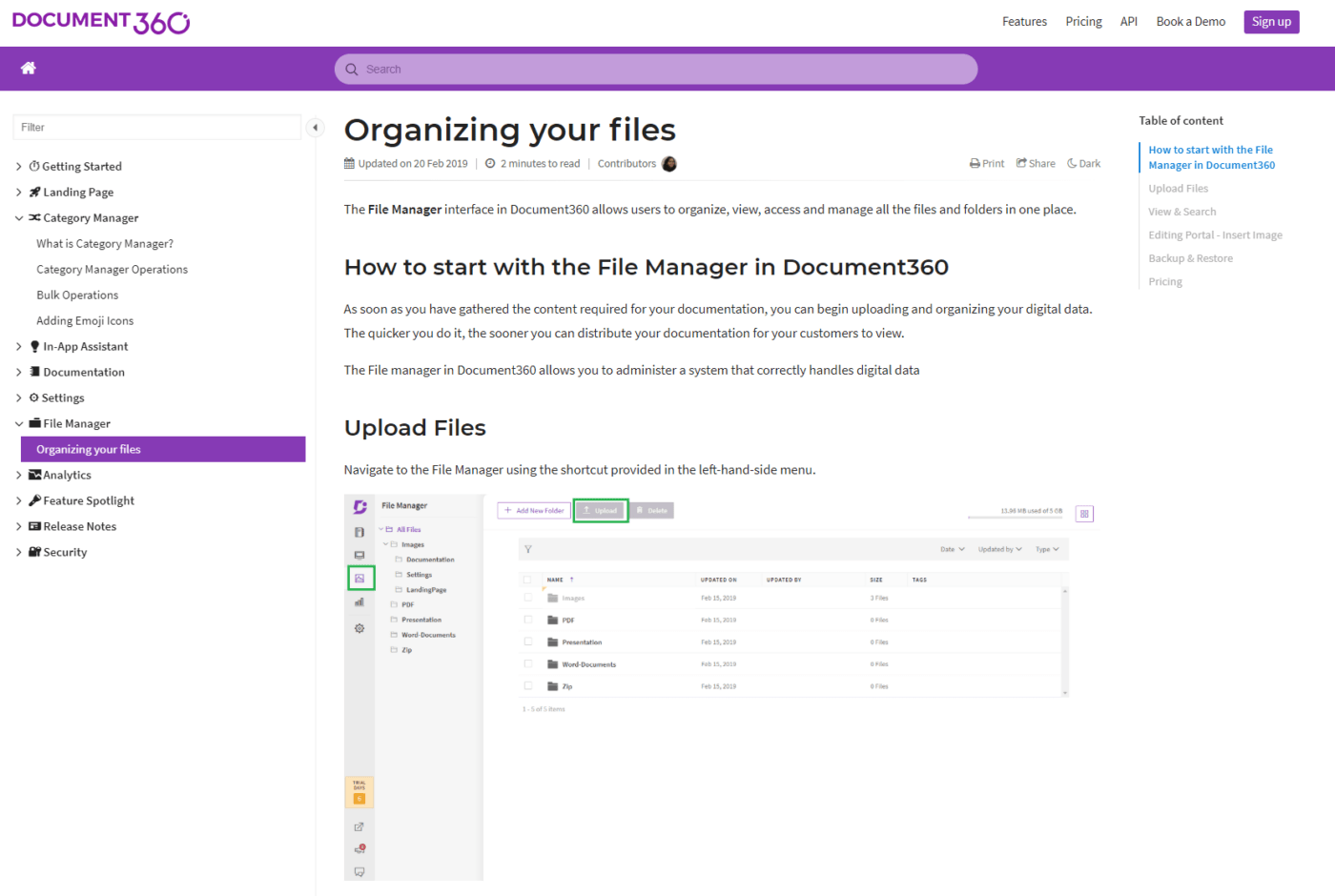
Document360 is a versatile platform offering both internal and external knowledge bases. Thanks to its support for popular editing tools like WYSIWYG (What You See Is What You Get) and Markdown, it allows non-technical users to create high-quality documentation.
One of Document360’s key selling points is its built-in collaboration capabilities. Assign roles like Owner, Administrator, Editor, and Draft Writer to team members to control access protocols at a granular level. The user experience for those accessing the knowledge base is equally seamless, thanks to advanced search filters, keyword searches, and AI-powered recommendations. 🤖
The platform provides flexibility in configuring knowledge bases as public, private, or a combination of both.
Document360 best features
- WYSIWYG and Markdown support
- Advanced search filters and AI recommendations
- Built-in content review reminders
- Granular access controls
- Detailed analytics for insights into knowledge base usage
Document360 limitations
- Interface can be slow occasionally
- Analytics only support a 30-day timeframe
Document360 pricing
- Free Forever
- Standard: $149/month per project
- Professional: $299/month per project
- Business: $399/month per project
- Enterprise: $599/month per project
*All listed prices refer to the yearly billing model
Document360 ratings and reviews
- G2: 4.7/5 (300+ reviews)
- Capterra: 4.7/5 (100+ reviews)
6. Slab
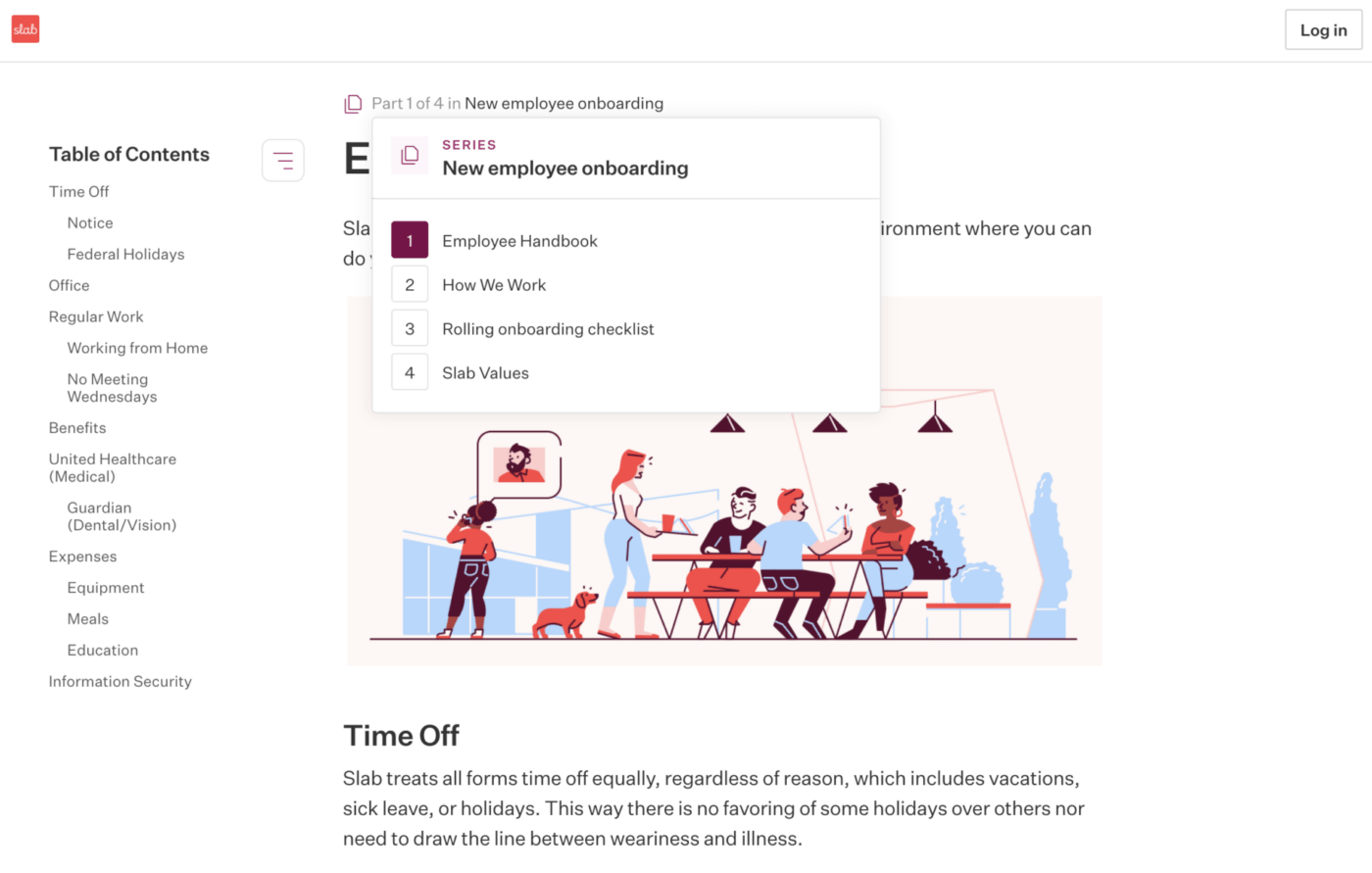
Slab lets you create, organize, and curate knowledge for internal staff, incorporating a wealth of tools primarily for engineering teams! Its collaborative options include co-editing documents, version control, and discussions via comments. 🤠
What sets this tool apart is its contemporary user interface, simplifying content navigation with minimal effort. Unlike traditional folder-based systems, it empowers team members to browse and discover information efficiently through Slab Topics, such as “How we work” or “Employee handbook” for better context.
With Slab, you can establish a unique identity for your internal wiki through a custom domain, provided you’re a Business or Enterprise plan user.
Slab best features
- Modern user interface
- Slab Topics for context-rich browsing
- Integrates with tools like Dropbox, Slack, and GitHub
- Real-time co-editing and commenting
Slab limitations
- Could use richer collaboration features
- Limited editing options for customer-facing teams
Slab pricing
- Free Forever
- Startup: $6.67/month per user
- Business: $12.50/month per user
- Enterprise: Contact the company
*All listed prices refer to the yearly billing model
Slab ratings and reviews
- G2: 4.6/5 (200+ reviews)
- Capterra: 4.8/5 (30+ reviews)
7. Evernote
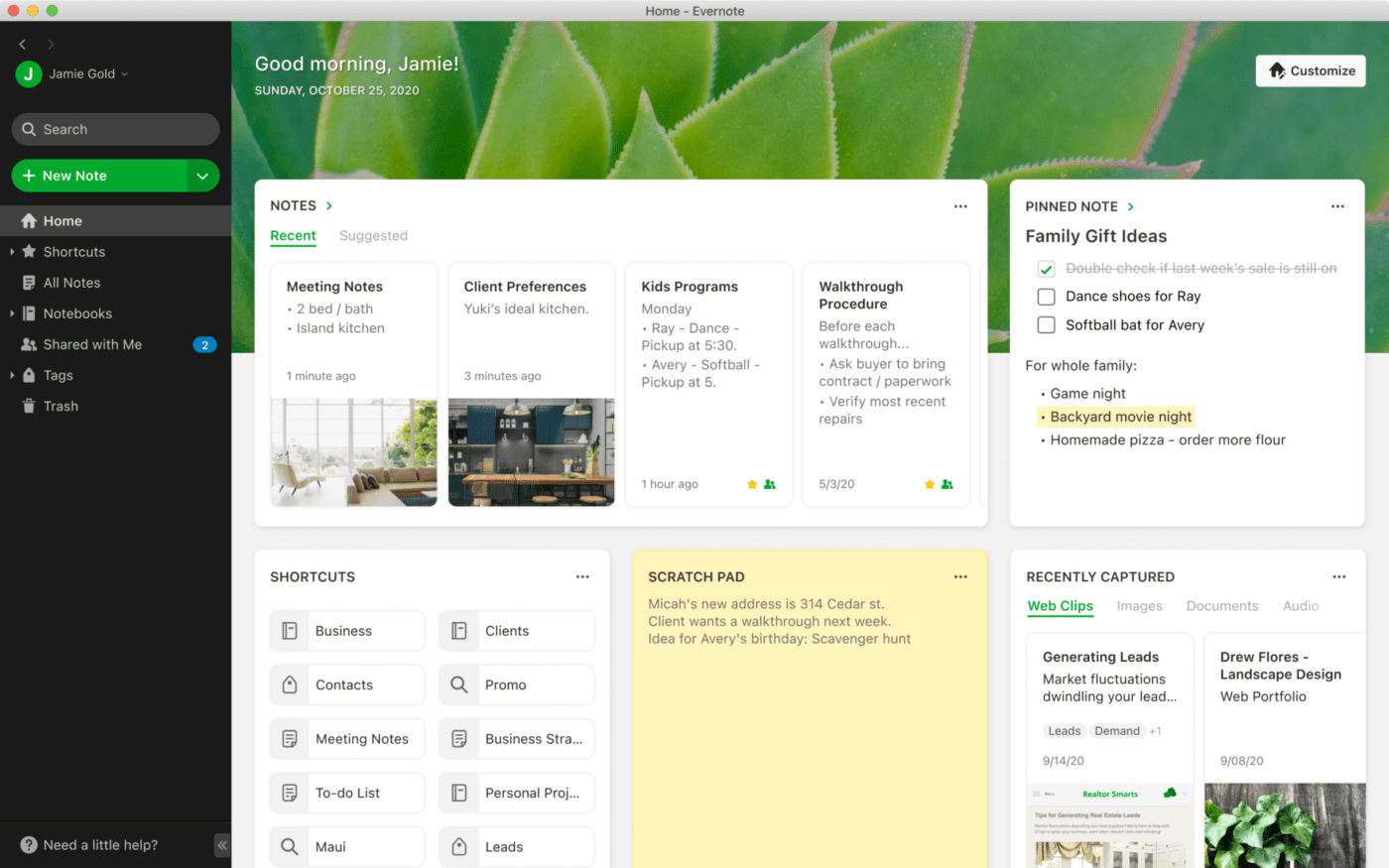
If you’re a busy person who likes to keep your plans organized or needs a reliable internal wiki, Evernote can be your digital memory bank. 😉
Its key advantage lies in its exceptional AI-powered note formatting feature called AI Note Cleanup. It allows users to tidy up scattered, incoherent notes (we’ve all been there!) while retaining the original intent and tone. With cross-platform syncing between mobile and desktop apps, your notes are always at your fingertips!
Evernote doubles as an efficient storage system, simplifying scanning and saving documents for future reference. Use its pre-designed templates and speech-to-text support for notes to reduce drafting time.
Love the platform’s vibe? You may want to check out these Evernote alternatives as well!
Evernote best features
- Offline access on mobile and desktop apps
- Versatile Evernote templates
- AI-enabled note formatting
- Integration with productivity and business tools
- Search and tag tools
Evernote limitations
- Many users find the free plan too limited
- Syncing can be slow at times
Evernote pricing
- Free Forever
- Personal: $10.83/month
- Professional: $14.17/month
- Evernote Teams: $24.99/month
*All listed prices refer to the yearly billing model
Evernote ratings and reviews
- G2: 4.4/5 (2,000+ reviews)
- Capterra: 4.4/5 (8,000+ reviews)
8. Helpjuice
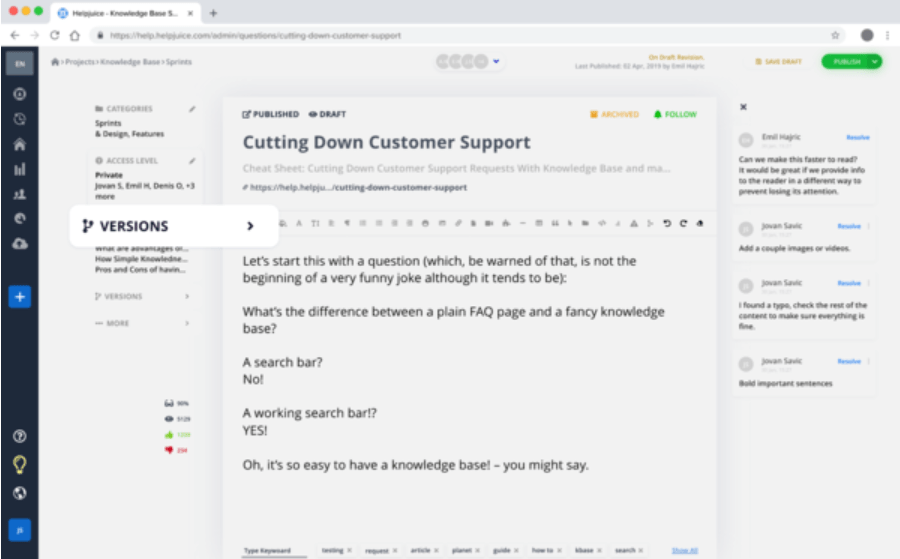
Helpjuice is designed for crafting Q&A content within your knowledge base. Its automated search helps you find topics and articles based on your queries. Essentially, you have a Google-like search engine at your disposal! 😁
The tool keeps a close eye on what people are searching for, offering detailed analytics on popular topics and referenced articles. With interactive troubleshooting and real-time collaboration options at your fingertips, your user experience should be top-notch.
This platform gives you access to numerous custom-made themes, helping you personalize each knowledge base to fit your unique requirements—at no extra cost.
Helpjuice best features
- Scalable self-service knowledge base
- Question tagging for a stronger search function
- Automated smart search for top topics and articles
- Multiple integrations, including Slack, Olark, and Zapier
- Supports MS Word imports
Helpjuice limitations
- Relatively pricey compared to competitors
- The text editor isn’t ideal
Helpjuice pricing
- Starter: $120/month (up to four users)
- Run–Up: $200/month (up to 16 users)
- Premium Limited: $289/month (up to 60 users)
- Premium Unlimited: $499/month (unlimited users)
Helpjuice ratings and reviews
- G2: 4.5/5 (20+ reviews)
- Capterra: 4.7/5 (90+ reviews)
9. Coda
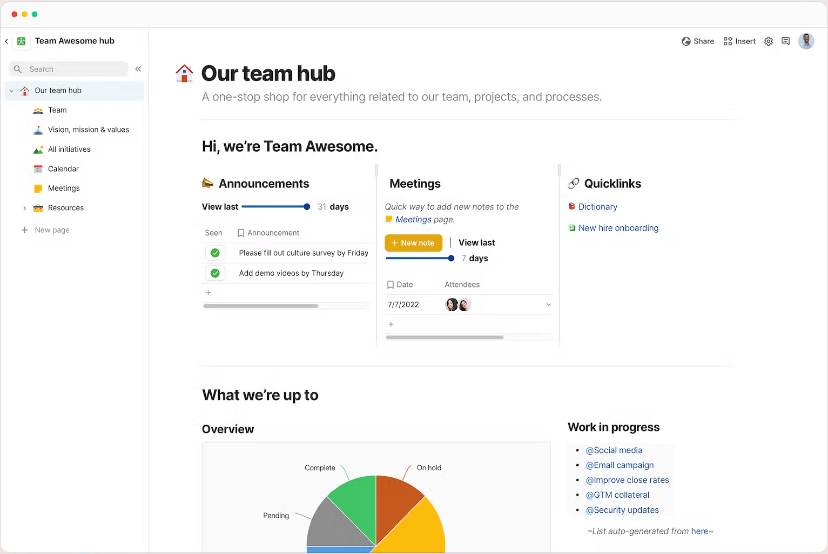
If your team is drowning in endless spreadsheets and pages, Coda can be your savior! 🦸
As an internal wiki tool, this platform simplifies creating documents, much like Google Docs, while ensuring easy sharing and publishing logistics. Plus, you can import your entire Google Calendar into your wiki!
With Coda AI, you can cut down the legwork by:
- Summarizing notes
- Generating knowledge base content and data insights
- Using chat dialogue to ask queries
Coda offers powerful word processing, spreadsheet, and database functions. Struggling to track tasks? Its customizable views let you adapt the platform to your unique requirements!
Coda best features
- Coda AI work assistant
- Integration with various applications
- Customizable views for adaptability
- Templates for efficient document creation
Coda limitations
- Integration capabilities have room for improvement
- Import options need to be optimized further
Coda pricing
- Free Forever
- Pro: $10/month per Doc Maker
- Team: $30/month per Doc Maker
- Enterprise: Contact for pricing
*All listed prices refer to the yearly billing model
Coda ratings and reviews
- G2: 4.7/5 (400+ reviews)
- Capterra: 4.6/5 (80+ reviews)
10. Tettra
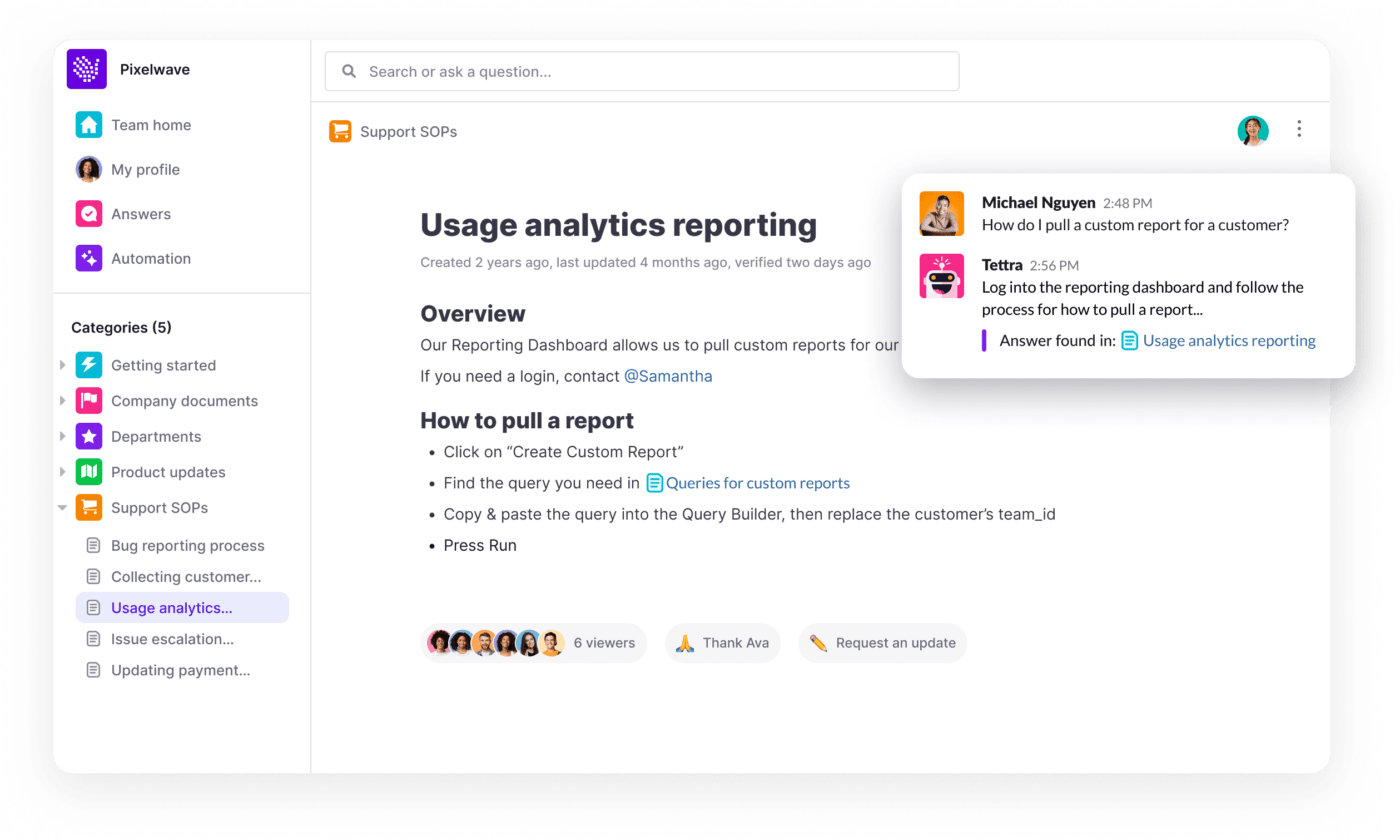
Tettra is another AI-driven wiki software on our list. It helps teams curate company information in an organized knowledge base, especially keeping new employees in mind. You can answer repetitive queries once and make onboarding processes smoother.
The platform’s Q&A feature, along with content verification, keeps knowledge base content up-to-date. Got queries? You’ll love Kai, Tettra’s AI assistant—it’s there for you with instant answers extracted from your company’s knowledge base.
Tettra also excels in organizing pages with categories, folders, and tags and allows straightforward content migration from other platforms. 🏷️
Tettra best features
- Kai, an AI-powered knowledge management assistant
- Q&A feature for interactive knowledge sharing
- Content verification
- Integration with Slack
- Excellent page organization
Tettra limitations
- Docs tend to look repetitive due to limited formatting options
- The search function is challenging to use sometimes
Tettra pricing
- Basic: $4/month per user
- Scaling: $8/month per user
- Professional: $12/month per user
*All listed prices refer to the yearly billing model
Tettra ratings and reviews
- G2: 4.6/5 (80+ reviews)
- Capterra: 4.7/5 (Less than 10 reviews)
Indecisive? Try ClickUp as Your Perfect Slite Alternative!
When it comes to collaborative documentation, data management, and knowledge sharing, there are plenty of options available as Slite alternatives. While each tool brings something unique, one can’t deny ClickUp’s expansive feature set.
The platform not only offers industry-leading knowledge management options but also follows top security protocols to keep your sensitive data safe from external threats. Give ClickUp a try and see how it transforms how your team operates! 🏆



